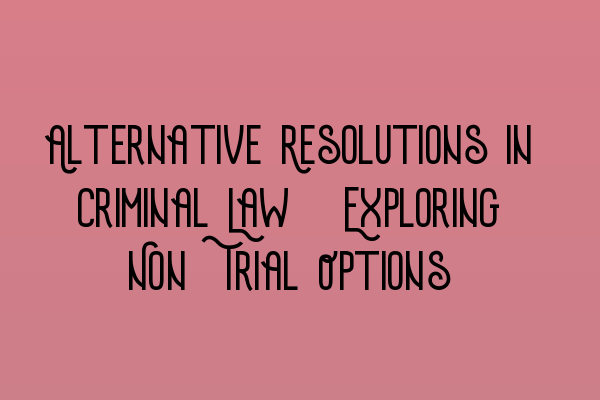Alternative Resolutions in Criminal Law: Exploring Non-Trial Options
As criminal lawyers at SQE Criminal Law & Practice Law UK, we understand that not all cases need to go to trial. In fact, alternative resolutions in criminal law provide a range of options that can save time, money, and stress for all parties involved. In this blog post, we will explore some non-trial options that defendants and prosecutors can consider.
1. Diversion Programs
Diversion programs offer an opportunity for defendants to avoid traditional criminal proceedings by completing a specified set of conditions. These programs aim to address the root causes of the offense and reduce the likelihood of recidivism. Common diversion programs include drug rehabilitation, community service, and educational programs.
Before opting for a diversion program, it’s crucial for defendants to consult with a qualified criminal lawyer who can assess the suitability of the program and negotiate the terms with the prosecution. The lawyer can also ensure that their client’s rights are protected throughout the process.
2. Plea Bargaining
Plea bargaining involves negotiations between the defense and prosecution to reach a mutually acceptable agreement. The defendant agrees to plead guilty to a lesser charge or a reduced sentence in exchange for a concession from the prosecution, such as dropping certain charges or recommending leniency.
This alternative resolution allows for a quicker resolution to the case and can help alleviate the burden on the court system. However, it’s essential for defendants to fully understand the consequences of their plea before agreeing to any bargains. Consulting with a knowledgeable criminal lawyer is crucial to ensure the best possible outcome for their case.
3. Restorative Justice
Restorative justice focuses on repairing the harm caused by the offense through dialogue, mediation, and understanding. It brings together the victim, the offender, and the community to actively participate in addressing the impact of the crime and finding a resolution that promotes healing and accountability.
This non-trial option can be particularly effective in cases where there is a desire for reconciliation, understanding, and addressing the underlying issues. Restorative justice programs provide a safe space for all parties involved to express their concerns, ask questions, and work towards a resolution that meets everyone’s needs.
4. Mediation
Mediation offers an alternative to the traditional adversarial court process. In this non-trial option, a neutral third-party mediator facilitates communication and negotiation between the parties involved in the dispute. This approach allows for a collaborative resolution, where the focus is on finding common ground and reaching an agreement that satisfies all parties.
In criminal cases, mediation can be beneficial in resolving conflicts between individuals involved in minor offenses or disputes that can be resolved without resorting to formal legal proceedings. It fosters open communication, understanding, and can help repair damaged relationships.
At SQE Criminal Law & Practice Law UK, we recognize the importance of considering these alternative resolutions in criminal law when appropriate. Our team of experienced criminal lawyers is well-versed in the intricacies of diversion programs, plea bargaining, restorative justice, and mediation. We strive to find the best possible solution for our clients, tailored to their specific circumstances.
If you have any legal inquiries or require representation, do not hesitate to contact us. We provide a range of legal services and offer SQE 1 Practice Exam Questions, SQE 1 Practice Mocks FLK1 FLK2, SQE 2 Preparation Courses, and SQE 1 Preparation Courses to help aspiring lawyers prepare for their exams.
Stay updated with the latest SRA SQE Exam Dates and continue exploring our blog for more informative articles on criminal law and legal practice.
